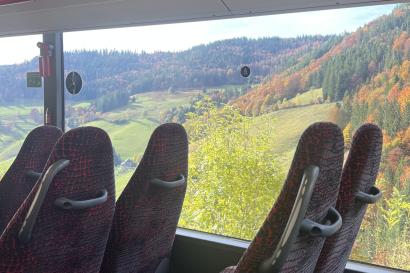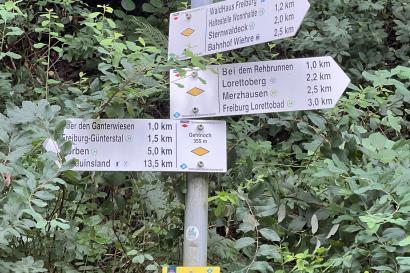
It has been exactly twenty-one days since I arrived in Freiburg. I want to tell you about the twenty incredible people I’ve met. I want to tell you about the streets I’ve wandered after class, the winding paths I’ve discovered through neighborhoods of colorful houses with tiny gardens. The conversations I’ve had with said twenty people, and the conversations I’ve wanted to have but couldn’t because of the language barrier. There’s so much to recount, and just over three weeks ago, I never imagined I’d be where I am now. I’ve been experiencing the exhilaration of independence, and I feel conflicted because it simultaneously feels as if I have full control over everything but also over nothing. I’ve stumbled into so many hidden treasures by choosing random streets to walk down; as they say, the best way to get to know a place is to get lost. I recently told a close friend that I felt like a tiny neuron, making connections in the giant brain that is Freiburg with every corner I turn. I am perpetually enamored with the city’s varied architecture; intertwining medieval and modern buildings offer a wordless narration of the city’s history, where old meets new. There is story everywhere you go, and sometimes I pause in the doorway of the Albert-Ludwigs-Universität to think about the fact that I walk the same halls Martin Heidegger, Hans Krebs, and Joseph Geobbels (to name a few) walked many years before. There’s still so much to discover here, so much that I’m nervous I won’t be able to get to everything before I leave.

There has been a lot of conversation about identity recently, since studying abroad confronts you with identifying your place in the world. I wanted to weigh in after hearing insightful friends make (and write about) some really interesting observations. As the lexicon of identity is so extensive, it’s been fascinating to learn both how people express themselves and how they wish to be perceived. I’ve found that I shy away from coming off as American, even though that’s a part of who I am. The first thing I tell natives when I meet them is that my dad is from southern Germany. Before coming here, a study-abroad crash course at Skidmore listed off the stereotypes that Americans have abroad, and while some may appear positive, stereotypes are stereotypes, and it’s intimidating to feel as if people might assume things about you before getting to know you. And it can be difficult to form an identity when you (quite literally) don’t have the words to express yourself. At the same time, I’ve met open-minded people while living in Freiburg, and despite the sporadic disparaging comment about the U.S, I still feel as if I can become part of the culture here.

On a related note, in a few classes I’ve taken at Skidmore with a favorite professor, we’ve studied how our way of understanding the universe is through our proclivity to categorize (check out Foucault if you haven’t heard of him). As far as recorded history goes, when we see something we don’t understand, we tend to compare it to what we already know. Travelers during the Middle Ages saw cotton plants and thought sheep grew out of the ground. Explorers during the Renaissance saw yellow tomatoes and called them golden apples. In this sense, human imagination has caused us to box things in to invent a sort of order. This clearly can be very dangerous, since it risks discrimination or labels that don’t necessarily apply. It’s important to understand and acknowledge the distinction between making comparisons to what you know and making assumptions or generalizations that can be harmful. Because of this, it’s been difficult to identify cultural differences without feeling as if I’m stereotyping. Like travelers of the Middle Ages and Renaissance explorers, I’ve been making sense of this culture by making comparisons to what I know at home, but I refrain from letting these observations become what I assume about everyone.

However, certain societal standards exist here; certain systems in place you have to honor in order to show respect. Some of these things are seemingly insignificant: make sure you have your money and bag ready while checking out at the grocery store, and don’t block the line packing up your groceries. Try not to assume everyone speaks English. You really shouldn’t walk in the bike path. Jaywalking is frowned upon and it’s not a good idea to cross the street when the little human symbol is red. These are just simple guidelines, though, and you have to recognize that you’re going to make social blunders. But, as I’ve said before, it’s going to be okay. When you live somewhere new, you adopt social skills and cultural differences that may be completely different from your own, and you aren’t going to know everything right away. With time, you pick up cues from other people, observing them on the tram or at a restaurant. And when you do make a mistake (because you will!), learn from it and move on. Every day here is a learning experience. In just three weeks, Freiburg has taught me so much about how I understand and perceive the world. I’m embracing learning about myself and about others, and as much as I’d like to think I have things figured out, I know it’s still only the beginning.


Manuela Tauscher
<p>Hi! My name is Manuela Tauscher, an environmental studies major always on the hunt for good food and good friends. When I'm not outside, you can find me curled up with my cat, sleeping in, or cooking. Follow my travels as I study abroad in Freiburg, Germany, the Jewel of the Black Forest!</p>






